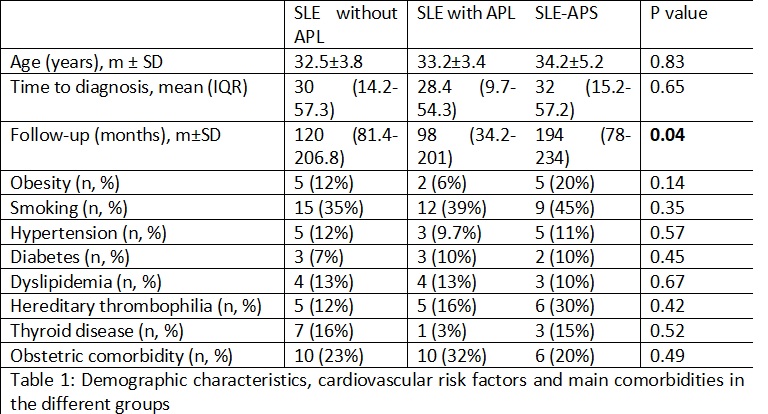Session Information
Date: Tuesday, October 28, 2025
Title: (2195–2226) Reproductive Issues in Rheumatic Disorders Posters
Session Type: Poster Session C
Session Time: 10:30AM-12:30PM
Background/Purpose: Pregnancy in patients with systemic lupus erythematosus (SLE) is associated with significant maternal and obstetric risks, particularly in the context of antiphospholipid syndrome (APS). While these risks are well-documented, the impact of isolated antiphospholipid antibodies (aPL) without overt APS remains unclear. Bridging this knowledge gap is critical to tailoring management strategies for this subgroup of patients, who may face unique clinical challenges. This study aimed to compare clinical characteristics, maternal comorbidities, obstetric complications, and pregnancy outcomes among three groups of SLE patients: those without aPL, those with isolated aPL, and those with secondary APS, using data from a multicenter Spanish registry of pregnancies.
Methods: A multicenter retrospective cohort study included pregnancies in women fulfilling the 2012 SLICC or 2019 ACR/EULAR classification criteria for SLE. Patients were classified into three subgroups: SLE without aPL, SLE with isolated aPL, and SLE with secondary APS. Data were collected at preconception visits, during each trimester, and post-delivery. Key variables included clinical and immunological profiles, maternal comorbidities, obstetric history, pregnancy complications, and delivery outcomes. Comparative analyses were performed to evaluate maternal and fetal outcomes across the subgroups
Results: A total of 201 pregnancies were analyzed across three groups: SLE without aPL (n=43), SLE with isolated aPL (n=31), and SLE-APS (n=20). While the groups were similar in demographic characteristics and comorbidities, there were striking differences in pregnancy outcomes. The SLE-APS group, experienced the highest rates of adverse pregnancy outcomes. In fact, 60% of pregnancies in this group faced complications, a stark contrast to only 20% in the SLE without aPL group and 5% in the SLE with isolated aPL group (p< 0.0001).The SLE-APS group also had significantly higher rates of preterm delivery (27%) and fetal death before 10 weeks (30%) compared to SLE without aPL (14% and 9%, respectively) and SLE with isolated aPL (6% and 5%, respectively, p=0.04 and p=0.02). The risk of fetal death before 10 weeks was particularly concerning in the SLE-APS group, with nearly one-third of pregnancies affected. Interestingly, despite the increased risk of complications, live birth rates remained relatively similar across all groups, with 70–77% of pregnancies resulting in live births (p=0.34). However, the SLE-APS group showed a notable trend towards higher IVF failure rates (30% compared to 3% in the SLE without aPL group), which may suggest a more complex reproductive challenge for women with APS (p=0.06).
Conclusion: This multicenter study highlights the increased risk of adverse pregnancy outcomes in women with SLE-APS, particularly fetal death before 10 weeks and preterm delivery. Although women with isolated aPL also face higher pregnancy risks compared to those without aPL, their outcomes are less severe than those with APS.
 Table 1: Demographic characteristics, cardiovascular risk factors and main comorbidities in the different groups
Table 1: Demographic characteristics, cardiovascular risk factors and main comorbidities in the different groups
.jpg) Table 2: Maternal and Pregnancy Outcomes in SLE Patients Stratified by aPL and APS Status
Table 2: Maternal and Pregnancy Outcomes in SLE Patients Stratified by aPL and APS Status
To cite this abstract in AMA style:
Sieiro c, Ordas Martínez J, Merino A, Amar Muñoz H, Burger S, Braña Abascal I, Jose Mendéz C, Dos Santos Sobrín R, Puga Guzman J, Blanco R, Taboada Martínez V. Pregnancy outcomes in Systemic Lupus Erythematosus: Insights from a multicenter Spanish Study on the impact of antiphospholipid antibodies and APS [abstract]. Arthritis Rheumatol. 2025; 77 (suppl 9). https://acrabstracts.org/abstract/pregnancy-outcomes-in-systemic-lupus-erythematosus-insights-from-a-multicenter-spanish-study-on-the-impact-of-antiphospholipid-antibodies-and-aps/. Accessed .« Back to ACR Convergence 2025
ACR Meeting Abstracts - https://acrabstracts.org/abstract/pregnancy-outcomes-in-systemic-lupus-erythematosus-insights-from-a-multicenter-spanish-study-on-the-impact-of-antiphospholipid-antibodies-and-aps/
